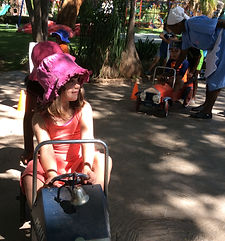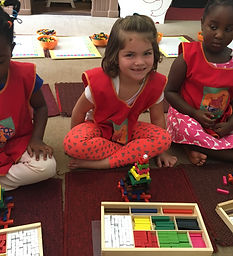Facilities
Once Upon a Time Nursery School offers an expansive range of facilities to enhance your child’s learning experience.
Playground



Animal Touch Farm

The pre-school sits on an acre of lush gardens, offering a large shaded playground, packed with wonderfully varied and high quality equipment (Step-Two) to keep your precious ones happily entertained during their break time. For those children requiring quieter play, we provide open air carpeted pavillions, with large scale construction toys (Megablocks).
Traffic Awareness


We have a comprehensive traffic centre, complete with a miniature traffic light, a ‘Mr Plod' the Policeman's outfit, pedal cars, scooters, motorbikes, a zebra crossing and even hand held road signs. It is here that we endeavour to give your children valuable life skills by teaching them about road safety, and making them aware of possible traffic dangers.
We have a fenced area where the children can watch and feed rabbits, tortoises, guinea pigs and see the ducklings at play in the pond. We also have a petting area where the children are able to touch and feel the creatures. Not only is the interaction fun, but it teaches children to enjoy the beauty of nature and instills in them a respect for other creatures.
Dollies Corner


Encouraging a child’s imagination is a very important part of early childhood development. One of the ways in which we cater for this is in our ‘Dollies Corners’, in each classroom, which are fully equipped with a miniature kitchen, bedroom furniture, laundry equipment, prams, dolls and clothes. There is also a large collection of 'dress-up' apparel. Role Play is very important in the curriculum.
Sand and Water Play


Swimming


Many scientific principles can be taught informally using our impressive range of sand trays, water trolleys and toys. Not only do Sand and Water Play aid in the discovery of new textures, but also help to develop children's natural curiosity about the world they live in, and improve their fine motor skills.
Sensory Play


Developing and cultivating skills through Sensory Play.
Children learn best and retain the most information when they engage their senses.
By giving the children the opportunity to investigate materials, we are helping them develop and refine cognitive, social, emotional, physical, creative and linguistic skill sets.
Here's how:
Cognitive - present a child with a problem and various materials with which to find a solution, and we can almost see the connections their brains are making e.g. deciding how to build a boat that will float. Simple science skills such as cause and effect (what happens when I add water to sand). Children make predictions and observations and develop thinking skills.
Linguistic - Sensory play encourages children to use descriptive and expressive language, and to find meaning behind meaningless words and gibberish e.g. the word (slimey).
Physical - some examples of sensory play benefit the development of fine motor skills by encouraging manipulation of materials, such as mixing, measuring, pouring and scooping, while other examples, such as exploring surfaces, lifting, throwing, rolling and water play, help develop gross motor skills.
Bucking Bronco and Kangaroo Bounce
We offer children an introduction to swimming, where they can build their water confidence, whilst having fun in paddling pools, blowing bubbles, kicking, splashing, learning to float and developing breathing techniques. The 5-year old group uses the swimming pool, where sculling, floating and treading water skills are learnt. "Water confidence" is a vital skill.
Fine Motor Skills

Fine Motor Skills

The following skills are what we endeavour to teach the children in their development of Fine Motor Skills.
• Development of Fine Motor Skills (strengthening the small muscles of the eyes, hands and fingers)
• Develop Visual Motor Skills (cross the mid-line)
• Improve Visual Perception (learn about shape and colour)
• Sorting and Matching (learn to sort and match)
• One to One Correspondence (match an object to a drawing)
• Visual Closure (once half of the pattern has been completed, the rest can be done from memory)
• Figure/Background Skills
• Sequential Patterns (arrange objects in a set order or pattern - essential for number work)
• Tactile Skills (learning through the sense of touch)
• Spatial Relations (understanding positioning and sequence)
• Memory Skills (recreate patterns and sequences from memory)
• Analysis and Synthesis (break a pattern into its components part and then restructure it once gain)
These activities are taught at different stations in the classroom and at each station there are four children in a group. The children then rotate from one station to the next every 10 minutes to keep the children focused and interested and able to apply their skills.

Gardening (Rosy's Veggie Patch and
Fairy Flower Garden)
The children learn to test their strength in holding onto the mini "Bucking Bronco" bulls and keeping their balance. The children bounce around on the "Kangaroo Bounce Balls" and this helps strengthen and develop their core strength.




Mini Tennis Sets

Bean Bag Toss and Catch


Children will be standing opposite each other with the mini tennis net between them. Holding mini tennis raquets. Rolling, hitting and throwing different size balls over and under the mini tennis net.
Bean Bag Toss and Catch
The children throw bean bags through different size holes in themed boards.
The children stamp on a "bean bag catch board" to learn to catch a bean bag which has been flung in the air. Then different sized balls are placed on the board so that the children learn to catch a moving ball.
In celebrating World Environmental Day, "Connecting People to Nature" we are teaching the little ones about growing vegetables, fruits and flowers in our own school garden. Each class have planted veggies and pretty flowers (pansies, lobelia, allyssum, dianthus and asters) outside the kitchen for all the parents to see. The children are taught new vocabularly, learning about all the different vegetables and fruits and being able to name them and also learning new gardening skills. I feel this is a very important life skill, working with Mother Earth.
Climbing,Balancing and Crawling Station
Tt,Balancing and Crawling Station


Sensory Play - "Mud Cafe"
Mud Kitchen (Mud Kitchen Cafe)
The children get to experience and explore the different properties of mud. The children get to make "mud pies', "compost stew" and the "Dish of the Day" at the "Mud Cafe".
Development/Improvement of Gross Motor Skills
The following skills are what we endeavour to teach the children in their development of Gross Motor Skills:
-
Development of Gross Motor Skills (strengthening the large muscles of the arms and feet.)
-
Develop Gross Motor Skills (cross the mid-line
-
Development/Improvement of Fine Motor Skills
-
Improve Visual Perception (learn about shape and colour)
-
Sorting and Matching (learn to sought and match)
-
One to One Correspondence (match an object to a drawing)
-
Visual Closure (once half of the pattern has been completed, the rest can be done from memory)
-
Figure / Background Skills
-
Sequential Patterns (arrange objects in a set order or pattern – essential for number work. Always remembering to start from left to right. All activities are graded in difficulty)
-
Tactile Skills (learning through the sense of touch)
-
Spatial Concepts (understand position and sequence)
-
Memory Skills (recreate patterns and sequences from memory)
-
Analysis and Synthesis (break a pattern into its components part and then restructure it once again)
-
Basic Number Concepts (incidental counting, recognition of numbers, one to one association and number value) .
-
In the climbing, crawling and balancing activities - "Obstacle Course" and 'Running the Gauntlet" areas, the children are taught to explore on their own by walking on a slightly raised beam, negotiating their way through an obstacle course and training themselves with assistance as they manoeuvre their way in and out, rolling over, around and about objects in the "Obstacle Course" carpeted area.
This activity is to teach the children to recycle items for the protection of the environment. This is to help make the children aware of pollution, waste and how total disregard of our fellow humans and the animal kingdom are effected. We are teaching them to be mindful of the statement ...... "Everyone can make a difference". We teach the children through animated pictures to make it more fun for the children to learn how to recycle. These animated pictures are little monster like characters which are all colour coded to sort through the items in recycling. They are all colour coded depicting different items which need to be recycled.
The following Life Skills will be taught to the children:-
Polishing silver; tying laces and bows; tying a tie; fastening buttons and zips; doing up and undoing press studs; teaching the children to dress and undress themselves; scooping pasta and rice; whisking egg whites; measuring and weighing ingredients using a balance arm scale and sizing of different scales; hanging up washing; ordering of different sized cylinders; setting up a place for a meal.
Sensory Exploration


Fun Recycling Centre
Bean Bag Toss and Catch


Baking
Every Thursday, the children make biscuits from our famous biscuit dough mix and each batch we decorate with different toppings e.g. vermicilli, hundreds and thousands, smarties, silver balls etc. and a different theme is chosen each week using different shaped cookie cutters. We ice cupcakes and Marie biscuits, roll out pastries, making cinnamon rolls and make pancakes. We also measure and weigh dry ingredients and mix batter and knead dough from scratch, making Rock Buns.
Fine Motor Skill Activities





Fine Motor Skill Activites
In teaching the children to master their Fine Motor Skills and help develop their hand-eye co-ordination. I have introduced different stations with a group of six children placed at each station, where different activities are taught in a fun group activity. The children are learning to improve in their Manual Dexterity skills and are able to improve in their correct grasp of holding the pencil (pincer grip). Different activities are selected to enhance these Fine Motor skills.



Fine Motor Skill Activities
Fun Recycling Centre
Learning Life Skills for Practical Life

